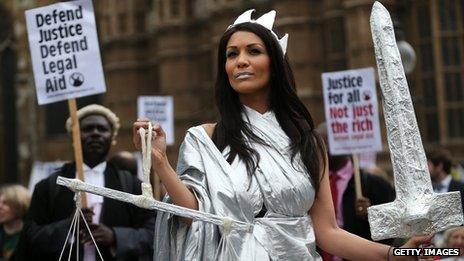Legal aid cuts: What has changed?
- Published

Some lawyers fear the cuts will fundamentally change the criminal justice system
Significant changes to civil legal aid in England and Wales came into effect on 1 April 2013, as part of a plan to reform the system and save £350m a year.
The changes meant some types of case were no longer eligible for public funds - including divorce, child contact, welfare benefits, employment, clinical negligence, and housing law except in very limited circumstances.
Critics warned that the changes would be damaging. So, a few months after the changes have been introduced, what has actually happened?
BBC Radio 4's Law in Action asked lawyers in England and Wales to send the programme specific examples of what the changes have meant to them, and their clients.
Since April nearly all family law advice has been removed from the legal aid scheme. This means people can no longer get funding for divorce or child contact or residence disputes.
"I recently had a case involving a four-year-old and a six-year-old where the four-year-old was being kept by his father after contact as and when he pleased," says Rebekah Wilson, a family barrister from Tooks Chambers in London.
"The four-year-old was very unsure about where he lived and who he lived with. Prior to 1 April the mother could have got legal aid but now she probably doesn't get it."
The changes mean victims of domestic violence must have proof before they can get legal aid for family cases.
Vulnerable clients
Cathy Barton, a family lawyer from Somerset, says that is problematic. She recently turned away a woman who said she had been raped by her partner, and who wanted legal advice regarding the breakdown of her relationship, because she didn't have medical proof that she had been abused.
"For us to have to send her away and say come back with some medical evidence was just entirely contrary to all of our beliefs and ways of working," says Ms Barton. "She hasn't come back to us yet."
Getting the relevant evidence can be expensive. A doctor's letter costs about £50, a memorandum of conviction £60 and a police disclosure £75.
"For my client who has no access to any money - or for a woman who has no recourse to public funds - she can't find £50 to pay for a doctor's letter," says Cris McCurley, a partner at Ben Hoare Bell Solicitors in Sunderland, who represents vulnerable migrant women.
But the government says that it has made every effort to ensure that victims of domestic violence are getting the necessary legal help.
"I spent a year on Laspo [Legal Aid, Sentencing and Punishment of Offenders Act 2012] and three times I moved the definition of domestic violence to be absolutely sure that we brought within the scope anybody who is genuinely affected by domestic violence," Justice Minister Lord McNally told Law In Action.
Plugging the gap
Some lawyers argued that changes to civil legal aid would lead to more people representing themselves in court - so-called "litigants in person" - which would slow down the court system.
Although the precise number of litigants in person is unobtainable, anecdotal evidence suggests there has been a rise.
"I have noticed since 1 April that there are more people in person, it slows the proceedings down and litigants in person have tended to be men," says Rebekah Wilson, a family barrister from London.
Funding for legal advice and representation for routine housing claims was removed from 1 April. Pete Moran, a development officer at Cumbria Law Centre, says that means legal help may now come too late.
He recently worked with a client who had employment, benefits and housing issues but Cumbria Law Centre could only offer legal help once he was at risk of losing his home.
"We often used to do a piece of legal aid-funded work for less than £160 to help a family facing homelessness. The collateral cost we understand of a family becoming homeless is between £14,000 and £30,000 for the public purse," says Mr Moran.
The government says the consequences of the changes to civil legal aid have not been as bad as the critics suggest.
"We have not found the kind of damage or destruction that they have alleged or forecast," says Lord McNally.
Some organisations are indeed finding new ways to plug the gap left by the removal of civil legal aid.
"We're in the process of finding that money and it's going relatively well. Mainly this is coming from small grant-making charities, in some cases from housing associations. So, bit by bit, we're moving towards a new funding model," says Mr Moran.
It is still too early for a full assessment of the impact of the changes to civil legal aid. The above testimony is impressionistic and based on the public's response to an invitation by the BBC Radio 4 programme Law in Action to share their experiences of the changes.
Law in Action is broadcast on Tuesdays at 16:00 BST and repeated on Thursdays at 20:00 BST on BBC Radio 4.
- Published4 June 2013
- Published31 May 2013
- Published20 March 2013